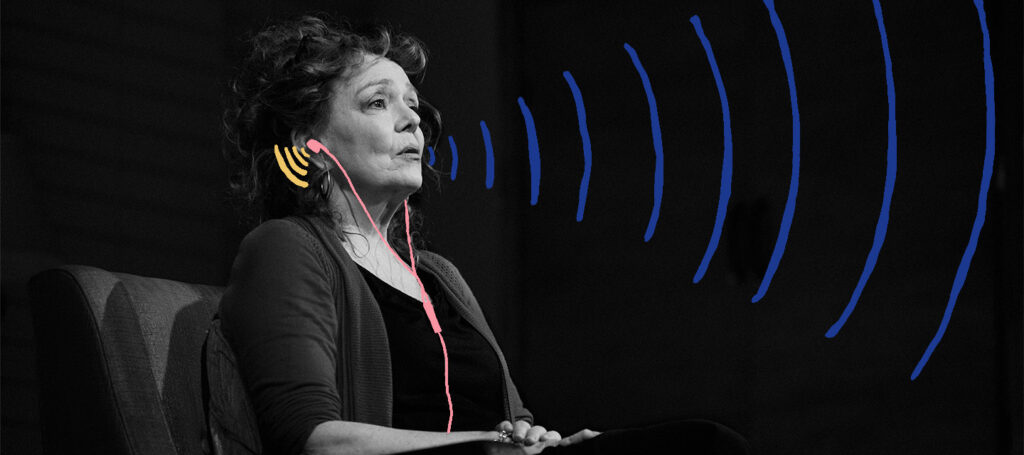


‘Dana H’: In Her Own Voice
There’s something sinister about a motel room.
I think of buzzing fluorescent lights, the lingering scent of tobacco on every surface, nondescript paintings over nondescript wallpapers, and faint conversations from the next room. I’ve got vivid memories of those details, all of which could’ve been from an actual stay in a motel somewhere along a road trip, or more likely, a collage of movie scenes, illustrating a general sense of despair. When I think of a motel room, I think of a small outpost of hell, a perfect, well, convenient backdrop for the renegade dreams of the American underworld.
The setting where the story of Dana H. took place.
The stage: A re-creation of a motel room in Florida.
In 1997, Dana Higginbotham was abducted by Jim (an ex-con and member of a neo-Nazi prison gang) whom she had become acquainted with working as a chaplain in a hospital psych unit. He was there after a suicide attempt.
Jim held Dana hostage in various motel rooms in Florida over the course of 5 months while abusing her mentally and physically. She never talked about her experience during that time to anyone until 2015, to writer and director Steve Cosson (Artistic Director of investigative theatre company The Civilians) in a series of interviews, which her son, the playwright Lucas Hnath reconstructed into Dana H.
In 75 gripping minutes, we hear the harrowing, first-person account of Dana’s kidnapping. What we see is actor Deirdre O’Connell (whose performance in The Vandal back in 2013 remains one of my favorite theatre experiences) lip-synching every word, every vocal tic, every breath in the recording, effectively re-enacting the process of the interview in astonishing details.
The majority of those 75 minutes pass in relative stillness besides the occasional movements O’Connell makes in her chair, captivating the entire audience with a single tap of her finger and every last microexpression.
Her performance is a rare combination of technical perfection and theatrical séance. For 75 minutes, she was Dana H; the voices did not come from speakers, but through her, like ghosts from the past making contact through a medium. Through O’Connell, we lived Dana’s story, as she relived hers, in her personal hell that’s a motel room in Florida.
Lip-synched performance in documentary theatre is nothing new. In fact, Cosson and Jessica Mitrani’s recent collaboration on The Undertaking (you can read my review at the time here) employed similar techniques and methods of investigation. However, it’s often a choice to make use of recordings over having performers channel the characters, in Dana H, it is a necessity.
I’m profoundly impressed by the creative team’s sincerity and respect in crafting the work, while keeping its heroine’s voice at its center. This is verbatim theatre at its best and most compelling.
Throughout the interview, or at least the selected clips, Higginbotham’s voice remained a remarkable level of calm. Along with O’Connell’s poised portrayal, you’d think she’s interviewing for a job, rather than recalling gruesome details of a crime. The words she chose are precise, as she zoomed in on her own past with objective, surgical eyes. And more often than the rare stray tears in her throat, you hear laughter.
You hear laughter sprinkled in her description of the interactions she had with the characters in the underworld of an America that’s hard for us to see, yet even harder to forget. Once we’ve been confronted with the brutality of Dana’s experience, her physical trauma, which she would describe in detail, albeit flatly, as well as her disappointment, “And they said ‘you know it’s just your word against his’.”
There’s a palpable resignation in the words as she spoke of being let down time and again by the police, none of them willing to help:
“and they talk
pat on the back, smile —
…
they’re not going to pick a fight with him
because they want to go home to their kids that night.”
This tale being 20 years old makes for a chilling reality check in an age where we have become increasingly aware of police brutality and ineffectiveness. We’ve recognized the fragility of our sense of security in the face of senseless violence. The riots in the Capitol back in January gave me a glimpse into a world I dared not imagine. The truth is it’s never far; the truth is, we could be just two degrees of separation away from a supremacist.
But what do we do with that realization?
During one surreal sequence in the production, the only time when Dana’s absent from the stage, Andrew Boyce’s hyper-realistic set was activated by Paul Toben’s sleek and dynamic lighting into a fever dream as:
A housekeeper enters the motel room to do the cleanings; she picks up the sheet on the bed; there’s blood on it; she doesn’t flinch; she doesn’t pause; she carries on her work in such a way that you know she’s not asking any questions.
There was blood on the sheet.
The moment rattled me, the inaction of a motel housekeeper, a woman of little consequence perhaps, who was also fearful of the world she’s adjacent to, and with fear came apathy, and with apathy came denial.
“Uh you know how how women victims
are very often blamed or held responsible
for the things that happen to them…”
Dana said that she felt “well-prepped for this whole situation”, and that her past trauma helped her survive. She also said that she couldn’t express her own anger the way Jim would; sometimes she wished she could.
I think about her calm voice, and every woman who’s been dismissed for being “hysterical”, who’s been advised to speak softly, to blame herself first. But Dana’s telling her story now, in her own voice, as a mother, as a survivor, as a woman: it’s difficult and long overdue.
So we pay attention: it’s the least we could do. She’s telling her story, not to be pitied, but as a release, as a release, as a release.
Keep Reading

‘The Lehman Trilogy’: Soulless and Expensive Children’s Theatre for Adults
Soulless and expensive―that’s the best way to describe the Broadway debut of The Lehman Trilogy at the David T. Nederlander Theatre. But then, what else should one expect from a 3 hour and 15-minute long theatrical-ish spectacle devoted to the history of one of the world’s largest financial firms? Es Devlin’s austere corporate office design […]
Read More
‘Thoughts of a Colored Man’ Falters and It Should Be Allowed To
Very few pieces of contemporary art show us Black men who are alive, on the “right” side of the law, and (in their own ways) thriving. ‘Thoughts of a Colored Man’, directed by Steve H. Broadnax III, and written by Keenan Scott II, does. Performed by seven phenomenal actors, the play centers on a cross-section […]
Read More












